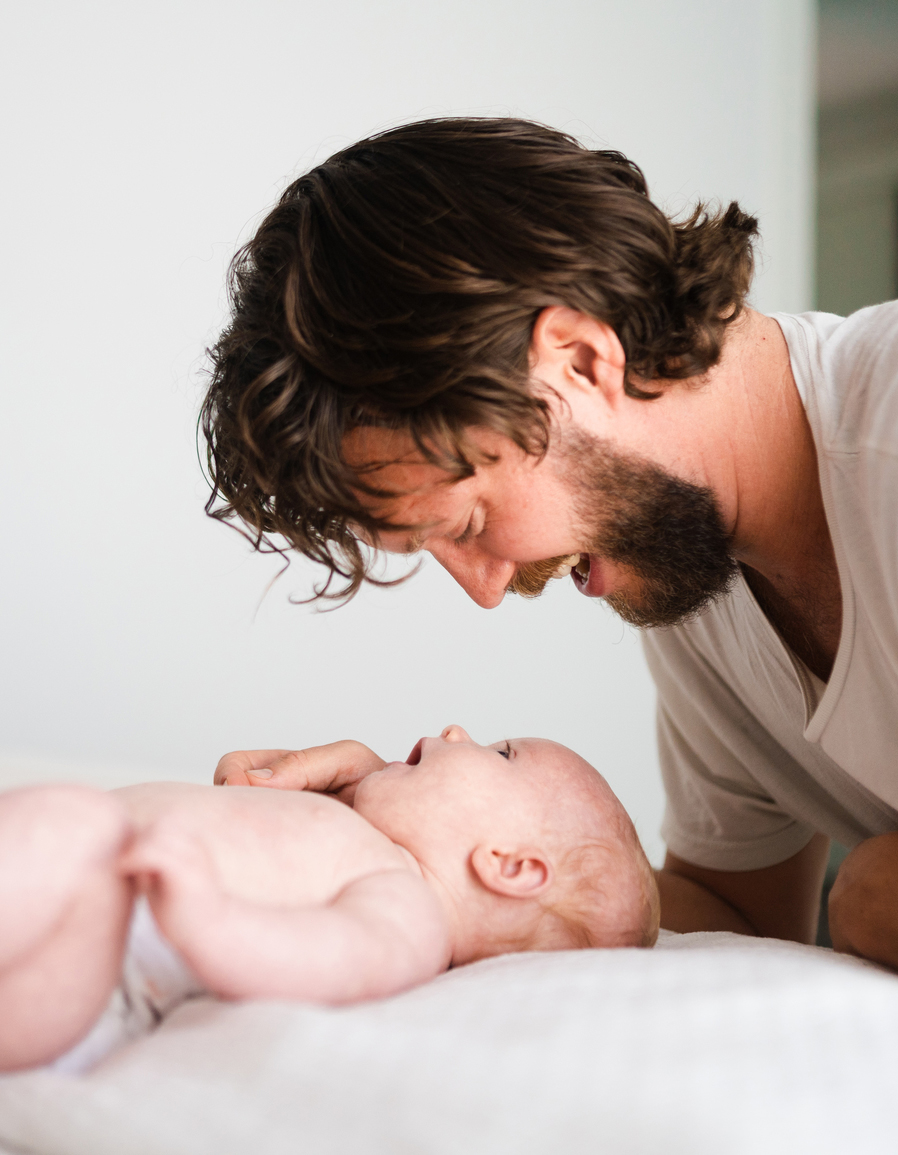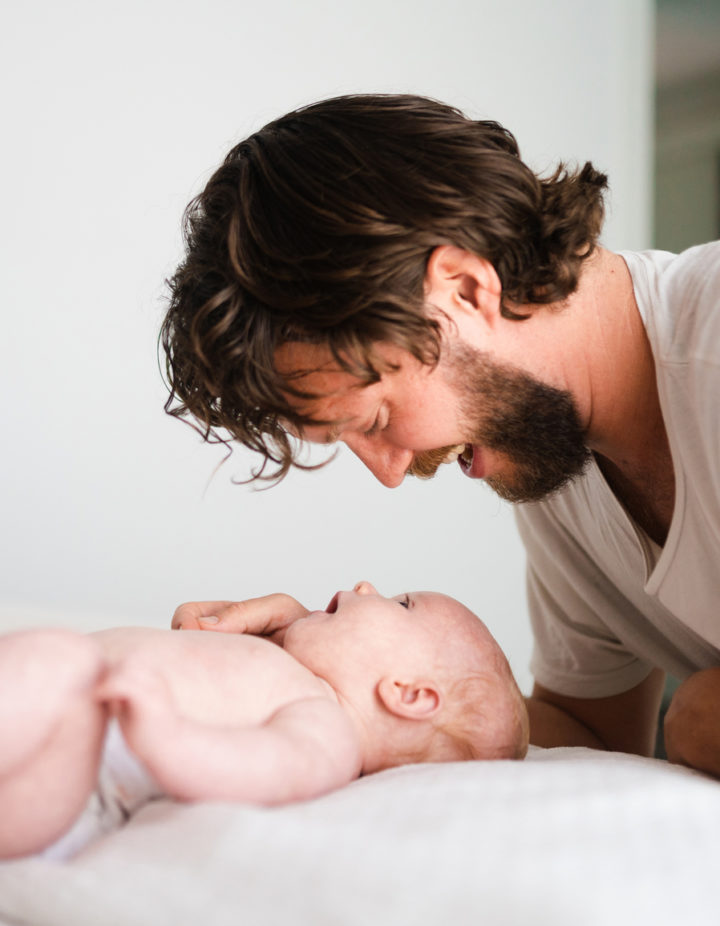That parenting blog? Your Instagram feed? The latest podcast episode? Chances are, most of the chatter focuses on moms and their roles in their children’s lives with little discussion about the unique role of fathers.
In honor of Father’s Day, we’re helping to turn the spotlight onto dad, and the evidence-based benefits of a strong father-child relationship.
While the parenting world spends a majority of time focusing on mothers, we have compelling research that fathers have a powerful part to play in their child’s development. Even cooler? The benefits of a strong father-child relationship exist on both sides of the dyad, improving both the quality and health of dads, and the lives of their children.
Let’s start with a few amazing studies. Research has shown that the more time fathers spend with their children, the more confident they feel as caregivers. Time spent caregiving actually lowers father’s risk of depression, and is associated with an increase in happiness, social connection and autonomy.
That’s no small feat. These results are based on a set of three studies sampling more than 18,000 dads that examined how fathers’ life satisfaction, well-being, and happiness are linked to the time they spend with their kids. And in this case, “time spent with kids” equals parenting. Not babysitting. Not “giving mom a break.” Just being with their kids, no matter the activity.
(Of note, the families in these studies were in heterosexual two-parent families. Although there is a push to include diverse family structures in research, there is still a long way to go!) In addition, these results are correlational, meaning that dads who felt less stressed to begin with are more likely to find spending time with their children to be fulfilling. That further highlights why dad’s mood plays an extraordinary part in his ability to be present and satisfied in his role.
The benefits of a strong father-child relationship exist on both sides of the dyad, improving both the quality and health of dads, and the lives of their children.
So what would interfere with dad’s mood around a new baby? Well…everything. Around 1 in 4 dads develop postpartum depression in the 6 months after becoming a father, according to results of a meta-analysis published in 2010. Risk factors for postpartum depression included things like unemployment, low social support, stress, financial strain, multiple children, history of mental illness and low relationship satisfaction with their partner. These risk factors aren’t unique to dads, but there is growing research around postpartum depression and anxiety among fathers that is gradually coming into focus as a vital issue. Understanding the transformation to parenting from a father’s perspective is crucial to building stronger resources to support fathers and keep them engaged in family life.
Families are systems, meaning that when one member of a family gets the support they need, it benefits everyone. This is especially true for our children, who are looking to their relationships with caregivers to create a blueprint for the future and a foundation for development. We don’t mean this as pressure, but instead as an incentive to make sure both parents get the help they need, not only to benefit their own mental health, but to be able to support their child most effectively.
It may also surprise you to learn that a study of first time dads found that two hormones linked to caregiving – prolactin and oxytocin – were important factors in how fathers both played – and emotionally connected – with their babies. First time dads with higher prolactin levels were more likely to engage their babies in exploratory play.
Why does this matter? Well, through this exploratory play, babies learn about objects in the world around them. They look at, taste, touch, smell, listen to, and manipulate objects, and each interaction builds on their understanding of its properties. Promoting this type of play can have a significant impact on a baby’s development, sense of autonomy, and critical thinking. In the same study, dads with higher oxytocin levels (known as the love hormone) had greater “affect synchrony” with their baby. Affect synchrony is when a caregiver and their infant are attuned to one another’s emotional states. This attunement can be seen through eye contact, parentese (that high-pitched, sign-song voice that many of us use naturally with our children), displays of affection, warmth and love.
Amazingly, caregivers’ hormones are also connected to one another, and caregivers’ oxytocin and cortisol levels synchronize when they care for children together. Parenting is a team sport on a very primal level! The question is, does caregiving trigger the release of these hormones, or do our hormone levels trigger our interest in caregiving? The jury is still out in the research, given that these studies tend to be correlational, but we know for sure that increasing caregiving behaviors can and does improve the overall mood for baby and dad.
Now onto the impact of father’s on their children. Studies show that when fathers gently push their children out of their comfort zones and encourage them to take risks, children are less likely to have anxiety. For boys, the more engaged a father figure is, the less likely the child is to have behavioral problems. For girls, their risk of struggling with a mental health problem as an adult is lowered by increased time and engagement with their dads. Using 12 years of data from over 6000 firms, economists found that when CEO’s had a daughter, the wages of their female employees’ rose relative to the wages of their male employees. In addition, warm, sensitive father-child interactions are linked to toddlers’ planning, memory, problem solving, and impulse control. This isn’t nice-to-have, it’s vital.
We also understand that support for the co-parent enriches the emotional environment in which children live. Having a partner who is involved, sensitive, and responsive, not only benefits the child, but the co-parent as well (even if they are not married). In the partnership around their children, fathers can add balance, bring new perspective, and uniquely inspire and influence day-to-day life. Perhaps if we celebrated their contributions more, or invested in support and education for those new to fatherhood, we could change the narrative about parenting to be more inclusive, inspiring, and representative of the dads we all know and love.
Parenthood is complicated – Cooper’s goal is to help un-complicate the parts of parenthood that should be simpler. We are your online parenting homebase, carefully matching you with a group of kindred parents, and using research-backed expertise to guide you through your parenting journey.
Sources:
Dahl, M. S., Cristian L. D., & Ross, D. G. (2011). “Like Daughter, Like Father: How Women’s Wages Change When CEOs Have Daughters.” Working paper. Columbia Business School. Available at: http://www1.gsb.columbia.edu/mygsb/faculty/research/pubfiles/4558/DaughtersofCEOs.pdf.
Feldman, R., Braun, K., & Champagne, F.A. (2019). The neural mechanisms and consequences of paternal caregiving. Nature Reviews Neuroscience, 20, 205-224.
Gordon, I., Zagoory-Sharon, O., Leckman, J. F. & Feldman, R. (2010). Prolactin, oxytocin, and the development of paternal behavior across the first six months of fatherhood. Hormones and Behavior, 58, 513–518.
Hertz, S., Bernier, A., Regueiro, S., & Cimon-Paquet, C. (2019). Parent-child relationshipsand child executive functioning at school entry: The importance of fathers. Early Child Development and Care, 189, 718-732.
Möller, E. L., Nikolić, M, Majdandžić, M., & Bögels, S.M. (2016). Associations between maternal and paternal parenting behaviors, anxiety and its precursors in early childhood: A meta-analysis. Clinical Psychology Review, 45, 17-33.
Nelson-Coffey, S. K., Killingsworth, M., Layous, K., Cole, S. W., & Lyubomirsky, S. (2019). Parenthood is associated with greater well-being for fathers than mothers. Personality and Social Psychology Bulletin, 45(9), 1378–1390.
Paulson, J.F., Bazemore, S.D., 2010. Prenatal and Postpartum Depression in Fathers and Its Association with Maternal Depression A Meta-analysis. Jama-J. Am. Med. Assoc. 303 (19), 1961–1969.
Sarkadi, A., Kristiansson, R., Oberklaid, F., Bremberg, S. (2008). Fathers’ involvement and children’s developmental outcomes: A systematic review of longitudinal studies. Acta Pediatrica, 97, 153–158.
Wang, D., Li, Y., Qiu, D., & Xiao, S. (2021). Factors influencing paternal postpartum depression: A systematic review and meta-analysis. Journal of Affective Disorders, 293, 51-63.


